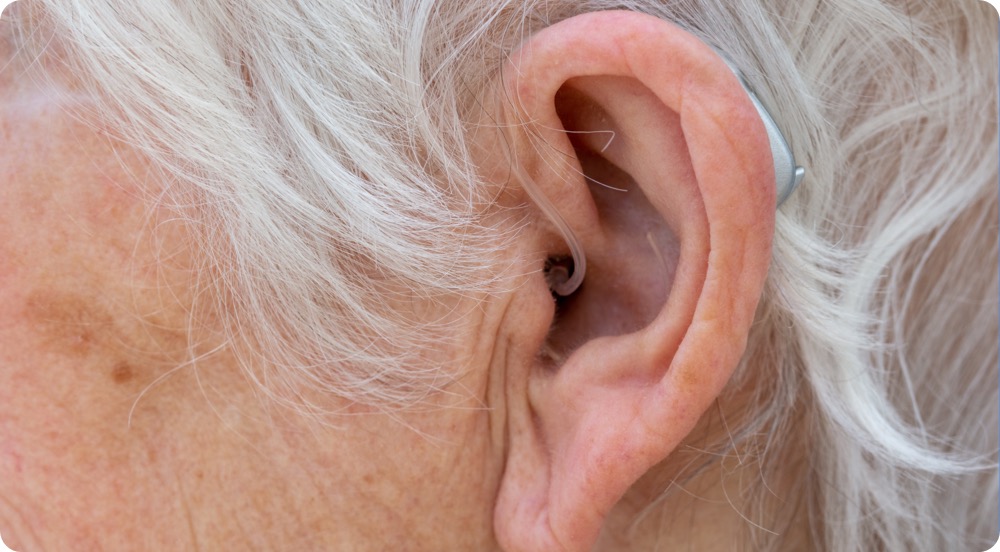
Your Medicare Guide ﹥ Does medicare cover hearing aids? Does medicare cover hearing aids?

Free Medicare Comparison
Enter your zip code & compare plans.

Free Medicare Comparison
Enter your zip code & compare plans.
What Do You Need To Know
Does Medicare Cover Hearing Aids?
Original Medicare traditionally doesn’t cover hearing aids or any other hearing care. However, it may cover diagnostic tests if they are necessary to treat a different condition. Medicare also does not cover dental, acupuncture, vision, or chiropractic care or services. Other types of Medicare, like Part C, however, may cover hearing aids.
You can learn more about what Medicare does and doesn’t cover here.
What is Medicare, and Who is Eligible?
Medicare is a government-funded health insurance program for seniors who are 65 years or older. It may also cover people under the age of 65 years if they have a disability. While Medicare covers many healthcare costs, it doesn’t typically cover dental, hearing aids, or vision.
Original Medicare includes the following parts :
- Part A: Part A is hospitalization insurance and does not cover hearing aids.
- Part B: Part B is medical insurance and does not cover hearing aids.
- Part C: Part C is Medicare Advantage, a policy available through a private insurance company. It may cover hearing aids, depending on the plan.
- Part D: Part D is prescription coverage and does not cover hearing aids.
If you need assistance with hearing aid coverage, it’s best to look into a Medicare Part C Advantage plan. In addition, Medicare Advantage plans can help you cover other healthcare costs.
What Does Medicare Cover?
The Original Medicare program does not cover any costs associated with hearing aids or hearing tests. In fact, their website states explicitly that policyholders are to cover 100% of hearing aid and exam costs. They also recommend contacting Part C plans in your area if you need a plan with hearing aids.
Medicare may cover some hearing tests. However, the hearing test must be recommended by your primary care physician. It must be a diagnostic, routine hearing exam done to test if you need medical treatment for other conditions. If Medicare does cover this, you will likely still be subject to 20 percent of the approved amount. You will also have to cover your deductible. The hearing exam cannot be for the purpose of a hearing aid.
Does Medicare Advantage Cover Hearing Aids?
Medicare Advantage, which is also referred to as Part C, may cover hearing aids, depending on your plan. If you need hearing aids, Part C may be your only option available through Medicare.
What is Medicare Advantage?
Medicare Advantage is an optional add-on insurance plan. It includes both Parts A and B, as well as any other additional coverages you may need. Part C plans vary, depending on your location and provider. You also have flexibility when choosing the correct Plan C for your needs. This means if you want a plan that also includes dental, hearing, or vision, you may be able to find one within your budget.
Even though Medicare Part C is offered through a private insurer, they are regulated by the federal Medicare program. This means that each plan must include the same level of Part A and Part B coverage available through the Original Medicare plan. The additional services, however, may vary. Medicare Advantage plans vary based on location, so it’s crucial to find one in your area that provides you with the hearing aid care that you require.
Other Payment Options for Hearing Aids
Even if you don’t currently have hearing aid coverage, you may have other options available to help you cover costs:
Medicaid
Medicaid is income-based, meaning you must meet specific income eligibility. Whether or not Medicaid will assist with hearing aid costs will vary, depending on your age and location.
Private Insurance
If you have access to a private insurance policy, you may have hearing aid coverage. Whether or not your private policy covers hearing aids will vary.
Discount Plan
Some otolaryngologists may be willing to work with seniors with payment plans if they don’t have coverage. Some may even have senior plans that offer better pricing to seniors who need hearing aids.
Plan Financing
Some otolaryngologists may also offer financing for hearing aids. However, this may be subject to credit.
You’ll also find that the prices of hearing aids vary from provider to provider. You do have a right to shop around and choose a provider that offers you a reasonable price or access to alternative payment options. Your state may also have programs that assist seniors with covering certain medical costs, like hearing aids. A few programs to try would be the AUDIENT program or Easter Seals.

What is Medigap?
Medigap, also referred to as supplemental insurance, is also a plan offered through a private insurance company. This program helps to offset the cost of medical services not available through Medicare Parts A and B. It may also help seniors cover expenses related to the Medicare plan, including copayments or coinsurance. Medigap doesn’t typically cover hearing aids.
How to Choose the Right Medicare Advantage Plan
If you plan on using a Medicare Advantage plan to assist with your hearing aid costs, it’s essential to choose the right plan. Keep in mind that Medicare Advantage plans also come with other costs to consider, including:
- Monthly premium
- Deductible amount
- Copayments
- Coinsurance
- Out-of-pocket costs
- Coverage limits
While you may not have control over how much you pay for Medicare Parts A and B, you do have the option to choose the Medicare Part C plan that works for you. If hearing aid coverage is important to you, make sure you check with the provider ahead of time to understand how much you will have to pay out of pocket for related costs.
When choosing the right Medicare Part C plan, consider asking questions like:
- Do I, or will I, need hearing aids?
- How much will hearing aids, including fittings, cost?
- How much can I expect to pay each year to maintain the hearing aids?
- Do I have to choose an audiologist in-network?
- How much am I responsible for paying out of pocket, including deductibles?
- Is there any coverage limit?
These types of questions can help you get an idea of how much coverage you need, as well as how much you’ll owe out of pocket. This can help you prepare for the cost of hearing aids.
What Types of Hearing Services Does Medicare Cover?
What your plan covers related to hearing care will vary from plan to plan, especially if you rely on a Medicare Advantage plan.
Original Medicare may cover other hearing devices that are medically necessary, including prosthetic devices. A few of these include cochlear implants or bone-anchoring hearing aids. These devices work similarly to hearing aids but are surgically implanted. These devices typically work for people who traditional hearing aids may not work as well.
Additionally, the Original Medical program may cover hearing and balance diagnostic tests for some patients, depending on their needs. These are usually for another medical condition, though.
The Importance of Hearing Care for Seniors
An otolaryngologist is a medical physician who treats the ears, nose, and throat. If you have hearing loss, your primary physician may refer you to an otolaryngologist.
Otolaryngologists also treat ear infections, swimmer’s ear, tinnitus, or other disorders of the outer and inner ear. Your primary care physician will work closely with the otolaryngologist, as this is important to your comprehensive care. Some common medical conditions, like high blood pressure or diabetes, can lead to hearing loss. Additionally, hearing loss can exacerbate other medical conditions, so it’s vital that they work together in your medical care.
If your physician recommends a hearing aid, you can expect to need a variety of other medical services. You may also need:
- A hearing aid fitting
- A hearing exam
- A balance test
- A ringing ear test
It’s always a good idea to find out what treatments or procedures are necessary so you can plan for your costs. The cost of the hearing aid is not typically the only cost you’ll incur.

Find affordable Medicare plans in your area

Find affordable Medicare plans in your area
Enter your zip code & compare prices
How Can Hearing Aids Help Seniors?
Hearing aids and ear care may be low on the list of priorities for seniors. However, hearing loss is a common condition for those 65 years or older. Studies show that hearing loss doesn’t just affect the sounds we hear. Hearing quality or ability can also be directly related to social isolation or depression. A loss of hearing can make seniors feel disconnected from those around them. It can make it difficult for them to carry on conversations or learn key details about their medical care. The research on how hearing loss affects seniors is still new but shows that it can significantly affect a senior’s quality of life.
Some studies also show that hearing loss increases the risk of falls. It disrupts the feeling of balance or being even, which can lead seniors to lose their balance. With estimates that as many as two-thirds of seniors have hearing loss, it’s important to begin considering how you will cover the cost of hearing care.
How Much Do Hearing Aids Cost Under Medicare?
If your Medicare plan does include hearing aid services, you may still be subject to certain costs. If your physician orders a hearing or balance test and it’s approved by Medicare, you will owe 20 percent of the approved amount. You will also have to pay your deductible before receiving insurance coverage.
If a hearing aid or test is not approved by Medicare, then you owe 100 percent of the costs. It’s always a good idea to ask about these costs, so you know how much you will owe before receiving the medical service.
If Medicare covers hearing testing for another medical purpose, you will also be subject to a 20 percent copayment, and you will also be responsible for meeting your deductible. If you use Part C to cover your hearing aid costs, you’re subject to the payment rules of your plan.
Medicare Advantage plans are usually affordable. Plans can be, on average, around $34 per month. This is much more affordable than when compared to the monthly costs that come with medical services, like hearing aids.
The Cost of Hearing Aids
It can also be helpful to consider the cost of hearing aids. It can be difficult to find affordable hearing aids without financial assistance. A study found that hearing aids can cost as much as $6,000 per ear. The average cost , however, is $2,300 per hearing aid. This, however, doesn’t include the maintenance that often comes with aids, including frequent battery changes.
The biggest variation in the pricing of hearing aids is technology. Hearing aids are designed with newer technologies each year which can make them easier to use. Basic hearing aids with limited technologies are usually cheaper, whereas if you want the latest technologies, you can expect to pay in the higher range.
The majority of seniors will need two hearing aids since most medical conditions affect both of the ears. How much you pay can vary on the medical provider and the type of hearing aid. Hearing aids typically come in either bundled or unbundled services. Bundled services include everything you need for the hearing aid, including the hearing test, consultation, fitting, and follow-ups. Bundled services may also include replacement or re-fittings if you have any problems with your hearing aids. Many may also include the needed hearing aid battery for the first year of use.
An unbundled hearing aid package means you pick and choose the hearing services you want upfront. This allows you to reduce your costs by removing any things that you may not find necessary. For example, you may be able to decline a warranty on the hearing aid or the included batteries.
Frequently Asked Questions About Hearing Aids
Here are a few of the most frequently asked questions about Medicare and hearing aids:
How Can I Apply for Medicare?
Applying for Medicare is easy. You can apply using the Social Security website. You are eligible to apply as long as you are within three months of 65 years. Make sure you apply for Medicare during your open enrollment period.
When applying for Medicare, you will need a few documents, including:
- Your Social Security number
- Date and place of birth
- Citizenship status
- Spouse information
Depending on your information, you may also need other information, including your employment history.
How Can I Apply for Medicare Advantage?
Before applying for a Medicare Advantage plan, you will need to choose the plan that you’re interested in. You can use Medicare’s Plan Finder to research your options. Then, you can visit each plan individually and learn how to join. Most plans will allow you to join online. When enrolling in a Medicare Advantage plan online, you will need certain documents. It is also helpful to have your Medicare number or card. The plan will also ask you questions about your enrollment in Medicare Parts A and B, so having that information available is also helpful.
Where Can I Get Medicare Advantage?
Medicare Advantage plans are available through private insurance providers, with a few including:
- Aetna
- Humana
- UnitedHealthcare
- Anthem
These are just a few of the available options. Additionally, Medicare Advantage availability will vary from state to state. Some plans may not be available in your state.
Will Hearing Aids Ever Be Covered Under Medicare?
A lot of medical professionals and lawmakers have come to realize how important hearing aids are to seniors. A Commonwealth study found that up to 75 percent of people who needed a hearing aid did not have access to one. A bill was introduced in 2019, H.R. 4056, that proposed Medicare pay for some audiological services.
Another bill was recently introduced, HR 1518, also proposing Original Medicare to cover hearing aids. None of these bills have yet been voted into law. While lawmakers will continue to push for hearing aid, and other coverage, under Medicare, it doesn’t currently cover it. This means that if you need hearing aid coverage, you may have to figure out other options.
The Clinical Review discusses that Original Medicare was not designed to cover hearing aid costs because they were low in cost. However, the Original Medicare plan was put in place in 1965, and a lot has thus changed. The cost of hearing aids has significantly increased due to new technologies. Additionally, new studies show just how hearing loss can impact seniors. Finally, with longer lifespans, seniors are experiencing hearing loss at higher rates than when the Medicare program was initially implemented.
Studies are beginning to demonstrate the importance of hearing aids and care for seniors. The Medicare program has not yet adjusted to accommodate these needs. Seniors who rely on Original Medicare or a Medicare Advantage program to cover their medical needs may need to find other options for their hearing aid care.
Consult a Medicare Agent
Questions about Medicare eligibility and enrollment? Or, if you are ready to enroll, consult an medicare agent today. Get Medicare plan options and information to find the right coverage to meet your needs.



